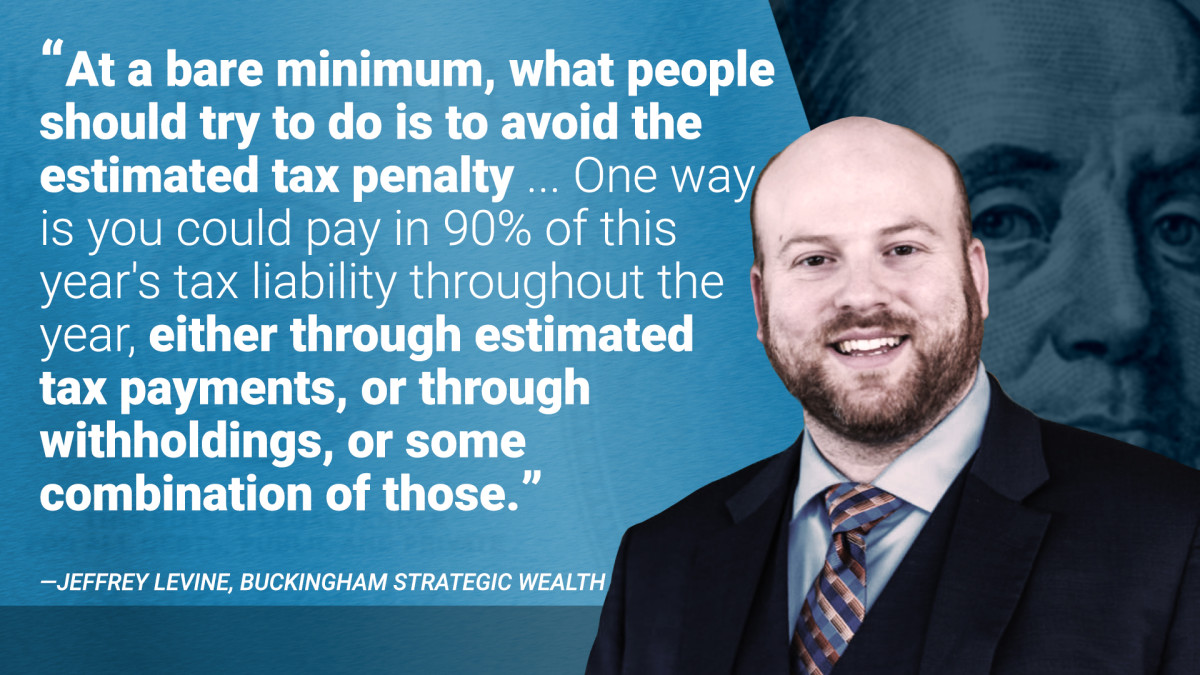The tax filing season is in full swing. According to the Internal Revenue Service, more than 63 million refunds have already been issued worth over $204 billion (as of April 1, 2022.
With so many refunds, it’s no surprise that taxpayers often ask: “Is it better to owe taxes, or is it better to get a refund?’. Jeffrey Levine, CPA and tax expert for Buckingham Strategic Wealth says there is another option!
Watch the video above to learn more.
Our TurboTax Live experts look out for you. Expert help your way: get help as you go, or hand your taxes off. You can talk live to tax experts online for unlimited answers and advice OR, have a dedicated tax expert do your taxes for you, so you can be confident in your tax return. Enjoy up to an additional $20 off when you get started with TurboTax Live.
Quotes| Is It Better to Overpay or Underpay Your Taxes? Jeffrey Levine, Chief Planning Officer, Buckingham Strategic Wealth Jeffrey Levine, Chief Planning Officer, Buckingham Strategic WealthRecommended Reading: Ways to Increase Your Tax Refund You Never Considered
Video Transcript:Robert Powell: Welcome to TheStreet’s tax tips with Jeffrey Levine from Buckingham Wealth Partners. So a common question we get is, is it better to underpay one’s taxes and owe the government money or to overpay and give the government an interest-free loan?
Jeffrey Levine: Are those my only choices? Is that it? My choice is either to dramatically underpay, so I have a penalty or overpay, so I have a massive refund. How about I just do good tax planning, and I pay about what I’m supposed to? And look, here’s the deal. A lot of people know approximately what their tax bill will be from year to year. They have a W-2 income, where they have a relatively stable business, and they take a standard deduction or they have itemized deductions, but they give about the same to charity each year. Their mortgage deduction isn’t changing dramatically from one year to the next. So for a lot of people, their tax bill, it’s fairly determinable even early in the year, right?
Recommended Read: Here’s What Happens if You Don’t File Taxes
So for instance, right now, we’re early in 2022. You could tell for a lot of people about what they will owe in 2022. Now, certainly for others, that’s not the case. At a bare minimum, what people should try to do is to avoid the estimated tax penalty. In most cases, you want to avoid paying any more than you have to. And so to do that, there are a couple of ways. One way is you could pay in 90% of this year’s tax liability throughout the year, either through estimated tax payments or through withholdings or some combination of those. The challenge, of course, Bob, is that if you don’t know what this year’s tax bill looks like, how do you know how much to pay? How do you know how much 90% of the unknown amount is?
And so the better way for a lot of people, the safe harbor way, if you will, is to base this year’s estimated tax payments on last year’s tax bill. For most people, that just means paying in 100 percent of last year’s tax bill throughout the year. If you are a high earner with more than $150,000 of income, then it’s 110 percent. So for argument’s sake, if you had a $20,000 tax bill last year, most people should pay $5,000 per quarter this year, and that will eliminate any penalty, even if they owe a lot more at the end of the year. So even someone who wins the lottery, Bob, on May 1st of this year and wins $100 million dollars. If their tax bill last year was 20,000, they only need to pay 5,000 each quarter, and they will avoid the estimated tax penalty. Now come next April, will they owe a lot? Yes, but they won’t have any estimated tax penalty.
And I’ll finish up with one last thought, Bob. It’s that, will they owe a lot? Yes, but that just requires some planning, doing some proactive work, not waiting until March or April when your tax return is due to look at your taxes. But doing it throughout the year, looking at your income, looking at your deductions and doing an estimate and saying, are we paying enough in? I would certainly say that if you have a very large refund, that’s not great tax planning because you are giving the government an interest-free loan. And the more interest rates rise, which we’re seeing now, the more costly that becomes to you. Similarly, you don’t want to underpay to the amount where you have a penalty. So the best tax planning, in my estimation, is to pay what you need to do to avoid a penalty, and then know how much more if any, you’ll need to add in in March or April when you file your taxes, so that you can have the best cash flow throughout the year, but also avoid those costly penalties.
